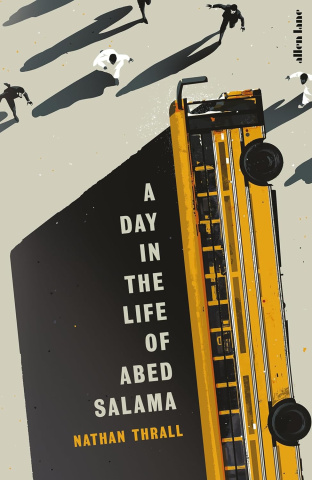
A Day in the Life of Abed Salama is a powerful, wrenching but compassionate book that goes a long way toward explaining the root causes of the Middle East conflict. It distils the occupation and oppression of Palestinians through the prism of a tragic road accident in the occupied West Bank in 2012. A thirty-ton, eight-wheel trailer collides with a school bus flipping it on its side and setting it alight. It is the kind of agonized event that every parent dreads. Abed Salama is the father of five-year-old Milad one of the kindergartners on the bus taking them on a school trip. As news of the accident filters back to him, he spends the day on a nightmarish loop from hospital to hospital, desperately seeking news of Milad and clinging to hope that he is one of the children dragged from the wreck. Abed is unable to travel to Jerusalem, where some of the injured are being treated, without the requisite blue ID pass and as the author pans out from the accident to reveal its wider context we become witnesses to the panoply of laws and restrictions imposed on Palestinians with the primary objective of separating them from Israelis. The author converts meticulous research and interviews into a narrative that sinks further into our consciousness because this is a work of non-fiction.
The driver of the trailer was working for an Israeli-owned quarry ‘plundering resources’ from the West Bank. In awful weather that limited his vision, the driver was travelling at nearly twice the speed limit on a pot-holed road. He had a litany of traffic offences and was not properly trained in applying the trailer’s breaking system. The trailer jack-knifed and collided with the oncoming bus with no divider on the middle of the road to protect traffic in the opposite lanes. The bus was carrying students from Nour al-Houda private elementary school, the best available for Palestinians stranded on the wrong side of Israel’s separation barrier with parents unable or unwilling to send their children to better schools in Jerusalem. As the bus’s fuel ignited and began to take hold there were incredible acts of bravery to try to save the children and terrible acts of negligence with the first Israeli paramedic arriving 24 minutes after the accident.
The subsequent trial and police investigation found the driver culpable for the accident but sentenced him to just thirty months’ imprisonment despite his negligence causing seven deaths. But the police investigation ignored the underlying causes of the accident including checkpoints, permits, the separation barrier, by-pass roads and illegal settlements designed to restrict the movement and rights of Palestinians. The investigation left critical questions un-answered: why had Israeli ambulances coming from Jerusalem been delayed at a gate in the separation barrier? Why had emergency services from West Bank settlements been delayed or sent to the wrong location? Why had Israeli ambulances and fire brigades in a settlement just a minute from the scene not been dispatched? Why had Israeli soldiers at a checkpoint in vision of the accident not hurried to offer assistance at the scene ‘letting the bus burn for half an hour’? And why had kindergarten students been forced by a permit system and separation barrier to navigate dangerous roads to Ramallah when playgrounds in a nearby settlement were much more accessible? All of these questions point at the legitimacy of a system of segregation described by Amnesty International, B’tselem, the Israeli human rights organization, and Human Rights Watch as apartheid.
We are introduced to the architect of Israel’s segregated transportation network, underpasses and ‘circuitous routes’ for Palestinians. Dany Tirza, head of the Israeli Defence Forces’ (IDF) strategic planning unit in the West Bank, was the author of the maps that re-drew the West Bank into areas A, B and C following the Oslo Accords in 1993. Oslo left Area C with 73 percent of the West Bank under Israeli control facilitating a rapid expansion of illegal settlements and turned Areas A and B into ‘dozens of small enclaves of limited Palestinian self-rule’. What this book does expertly and with great humanity is to convey how these re-drawn maps and the security system underpinning it have created a fiendish network of oppression that creates the kind of perfectly preventable tragedy at the centre of its story. The book has a large cast of characters including a Palestinian Authority representative, an IDF commander, paramedics, parents, relatives, social workers, rescue workers and members of the ultra-orthodox ZAKA organization which has the chilling task of collecting the dead for burial. In the aftermath of the accident, the book poignantly reveals how it impacted survivors forever trapped in the misery of that day. It unraveled relationships, triggered mental breakdowns, and caused terrible life-changing physical injuries.
Book jackets are often stuffed with over-praise from celebrated authors but one quotation from Arundhati Roy on the cover of A Day in the Life of Abed Salama chimed with this reader:
“I found myself pacing around between chapters, paragraphs and sometimes even sentences just in order to absorb the brutality, the pathos, the steely tenderness, and the sheer spectacle of the cunning and complex ways in which a state can hammer down a people and yet earn the applause and adulation of the civilized world for its actions”.
Following the recent escalation in occupied Gaza, the West Bank and Israel, the book’s American author, Nathan Thrall, has had readings in London, New York, Los Angeles and Washington postponed or canceled. But now is exactly the time to better understand the causes of the current crisis. As Paulo Freire wrote: ‘To surmount the situation of oppression, people must first critically recognise its causes’. Reading ‘Abed Salama’ will help you understand those causes.
Stephen McCloskey
27 October 2023
Thrall, Nathan (2023) A Day in the life of Abed Salama: A Palestine Story, London: Allen Lane.




